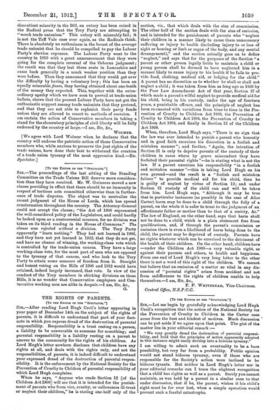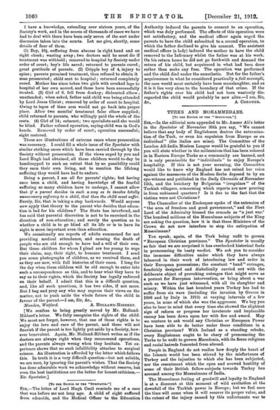[To TEE EDITOR OP THE "Erzernos."] SIR,—Let me begin by
gratefully acknowledging Lord Hugh Cecil's recognition that the action of the National Society for the Prevention of Cruelty to Children in the Carter case arose from the best and kindest of motives. Much discussion can be put aside if we agree upon that point. The gist of the matter lies in your editorial remark :-
" We very greatly dread the destruction of parental responsi- bility, and hold that the principles of action apparently adopted in this instance might easily develop into a hideous tyranny."
I am willing to admit such an eventuality to be a bare possibility, but very far from a probability. Public opinion would not stand hideous tyranny, even if those who are responsible for the Society's action were inclined to be hideous tyrants. But neither in Lord Hugh's letter nor in your editorial remarks can I trace the slightest recognition that a child has rights as well as a parent. Surely you cannot maintain, as was held by a parent in a similar case to that under discussion, that if he, the parent, wishes it his child's sight must be for ever lost, when a simple operation would prevent such a fearful catastrophe.
I have a knowledge, extending over sixteen years, of the Society's work, and in the scores of thousands of cases we have had to deal with there have been only seven of the sort under discussion taken into the courts. Let me give, shortly, some details of four of them.
(1) Boy, 101, suffering from abscess in right hand and on right cheek; wasting away ; two doctors said he must die if treatment was withheld ; removed to hospital by Society under order of court; boy's life saved; returned to parents cured ; great gratitude of parents. (2) Cripple boy of 4, injury to spine ; parents promised treatment, then refused to obtain it man prosecuted ; child sent to hospital ; returned completely cured. Mother has since taken two girls with crooked legs to hospital of her own accord, and these have been successfully treated. (3) Girl of 8, fell from donkey; dislocated elbow ; unattended ; when asked, father said child was being attended by Lord Jesus Christ ; removed by order of court to hospital. Owing to lapse of time arm would not go back into proper place. After two months' treatment false elbow supplied; child returned to parents, who willingly paid the whole of the costs. (4) Girl of 14; cataract; two specialists said she would be blind. Father refused operation, saying child was in God's hands. Removed by order of court; operation successful; sight restored.
These are illustrations of extreme cases where prosecution was necessary. I could fill a whole issue of the Spectator with similar striking cases which have been carried through by the Society without prosecution. If the views urged by you and Lord Hugh had obtained, all these children would to-day be handicapped to such an extent that by no possibility could they earn their own living, not to mention the lifelong suffering they would have had to endure.
Being a parent, I am all for parents' rights ; but having once been a child, and having knowledge of the fearful suffering so many children have to undergo, I cannot allow that if a parent decides in such a way as to involve totally unnecessary suffering to a child, that then the child must suffer. Surely, Sir, that is taking a step backwards. Would anyone now apply that theory to the parent who decides that educa- tion is bad for his children P The State has interfered, and has said that parental discretion is not to be exercised in the direction of non-education ; and surely the question as to whether a child is to go blind all its life or is to have its sight is more important even than education.
We occasionally see reports of adults summoned for not providing medical attendance, and causing the death of people who are old enough to have had a will of their own. But these children for whom I plead are too young to urge their claim, nay, their right, to humane treatment. I send you some photographs of children, as we received them, and as they are now, with full histories of their cases. I long for the day when these children will be old enough to enter into such a correspondence as this, and to hear what they have to say as to their rights, which the Society has legally enforced on their behalf. I admit that this is a difficult question, and, like all such questions, it has two sides, if not more. But I beg and pray any who may express their views on the matter, not to push aside the whole future of the child in favour of the parent.—I am, Sir, &c.,
[We confess to being greatly moved by Mr. Holland- Hibbert's letter. We fully recognize the rights of the child. We must not forget, however, that one of those rights is to 'enjoy the love and care of the parent, and these will not flourish if the parent is too lightly put aside by a Society, how- ever benevolent. Again, Mr. Holland-Hibbert writes as if the doctors are always right when they recommend operations, and the parents always wrong when they hesitate. Yet ex- perience shows that no such infallibility attaches to surgical science. An illustration is afforded by the letter which follows this. In truth it is a very difficult question—but not soluble, we are sure, by ignoring the parent's wishes. That the Society has done admirable work we acknowledge without reserve, but even the beat institutions are the better for honest criticism.— ED. Spectator.]











































 Previous page
Previous page